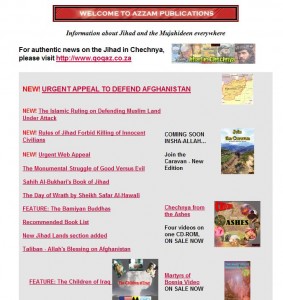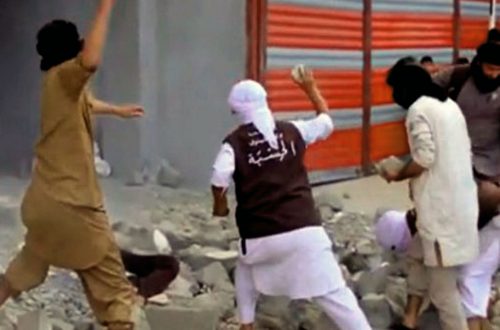Here’s some news from the Department for Communities and Local Government. It has established a panel of 13 “faith advisers who will act as a ‘sounding board’ to advise on effective engagement with faith communities, and the impact of Communities and Local Government policy on faith communities”. Here’s John Denham:
“This new panel brings together an unprecedented wealth of knowledge and experience that will help advise on the big issues facing society such as the economy, parenting, achieving social justice and tackling climate change.
“For millions of people the values instilled by their faith are central to shaping their behaviour. We should continually seek ways of supporting and enhancing the contribution faith makes to the decision-making process on the central issues of our time.
“Each adviser is has an outstanding track record of achievement. Together they will help inform Government on the views and values of faith communities, enabling us to learn from the unique insights that faith groups bring to contemporary issues.”
Now that’s some godawful pandering.
Let’s take a look at the “unique insights” of one of the new advisers, Wakkas Khan.
When he was president of the University of Manchester student Islamic society (ISOC), in 2001-2, he opposed the liberation of Afghanistan from the Taliban:
The ISOC group stood on the steps of the Union building with banners reading “Bombs Breed Hate” and “Islam is Peace”, as well as “Justice for Afghanistan”.
The event, which was intended as a peaceful statement rather than a demonstration, lasted around two hours, and involved a deliberately limited number of people.
Wakkas Khan, president of the Islamic Society, said that the event was an attempt by the society to take an active approach to the problems left in the wake of the terrorist attacks in America, and the resulting US-led bombing missions over Afghanistan.
“There’s been a lot said over the last few weeks about how Islam is a peaceful religion. Obviously that is true. But, also Islam is seen as a passive religion. We wanted to show that Islam does actively stand for certain things, Islam breeds peace by its nature. We also wanted to express our concern over the bombing in Afghanistan.
“We wanted to actively show our position on the situation. Islam is a religion where you get involved and work towards social order.”
For their part, to this day, as can be seen in a new poll, a majority of Afghans welcomed their liberation and support US troops in their country.
“Social order” for young Wakkas included boycotting Israel and businesses that work with Israel:
The motion, currently on display in the union building, condemns Israeli government actions, which it compares to those of South Africa’s Apartheid regime. Titled the ‘Human Rights’ motion, it protests against a number of specific actions by the Israeli security forces against Palestinians. It also carries several references to Israeli policy and officials as racist and unjust.
If passed at the General Meeting, the motion will establish all of these points as being union policy. It will implement a number of sanctions against Israel by the Union, for example a boycott of Israeli goods and businesses which sell Israeli goods.
…
In support of the motion, the president of the union’s Islamic Society, Wakkas Khan, explained to Student Direct that he hopes it will “create a general awareness of what is an abuse of the human rights of the Palestinians in Israel. Unfortunately there seems to be a tendency to defend Israel no matter what they do.”
Remember – this was back in 2001-2, just after the Durban Conference, when the “Israel Apartheid” campaign was in its infancy. Khan was an early adopter.
In 2003 Khan joined FOSIS, the umbrella body for ISOCs in the UK. In 2004 he became its president. In that role, he spoke up for Hizb-ut-Tahrir, denying that it was an extremist party:
A Guardian Education article sought to attribute the increased participation of Muslim students within the National Union of Students to a rising trend of “extremism” (Adding their voice to the debate, April 4). In the post-7/7 age, it is unfortunate that such accusations are levied at the Muslim community all too easily.
“The allegations stem from the Federation of Student Islamic Societies’ (Fosis) support for the removal of Hizb ut-Tahrir from the NUS’s No-Platform for Racists policy. When the decision to ban Hizb ut-Tahrir was taken in 2004, Muslim students were under-represented in the NUS and there was a lack of proper debate. Many unsubstantiated accusations have been levied against Hizb ut-Tahrir in the past, but in reality the organisation works to advance the Muslim world by engaging in political work. It uses non-violent means and is opposed to terrorism, having condemned the terrorist activities of 9/11 and 7/7. Many Muslims may have disagreements with the organisation, but they unanimously assert that this does not render it extremist; and they defend its right to free speech.”
He also defended Babar Ahmad at FOSIS’s annual conference in 2005:
Delegates at the three-day conference at Leicester University will be addressed by Muslim academics from around the world and attend a variety of workshops.
They will also hear from the wife of Babar Ahmad, who is facing extradition to the US on terror charges.
Fosis president Wakkas Khan said her presence reflected the students’ concern at anti-terror measures taken by the government since September 11.
“Mrs Ahmad is going to be touching on the issues surrounding what happened with her husband and the implications for the Muslim community at large.
“It was quite a shock for the Muslim community when this happened because they saw Babar as just another Muslim, it could be any of us,” Mr Khan said.
“Just another Muslim”? You can read Babar’s US indictment here (pdf). An excerpt:
AHMAD helped create, operate and maintain, and cause to create, operate and maintain, the websites referred to in paragraph 10 in Connecticut, Nevada, the United Kingdom, Ireland, Malaysia and elsewhere, and other internet media which posted materials designed and intended to recruit mujahideen, raise funds for violent jihad, recruit personnel for the Chechen Mujahideen, the Taliban and associated groups, and give instructions for travel to Pakistan and Afghanistan to fight with these groups, provide instructions for the surreptitious transfer of funds to the Taliban, and solicit military items for these groups, including gas masks and night vision goggles.
The websites and other internet media AHMAD helped create, operate and maintain through his expert advice and assistance would be and were used to support and justify violent jihad and his expert advice and assistance were directly and integrally linked to ongoing efforts to provide personnel, currency, military items, monetary instruments, and other material support and resources for acts of terrorism, as well as to conceal and disguise the nature, location, source and ownership of such material support and resources.
As for Khan’s “shock”, Babar Ahmad’s website, azzam.com, was indeed available for all to see. It is still in the web archive. Have a look at its “Urgent Appeal To Defend Afghanistan” jihadi message in the immediate aftermath of 9/11. Evidently Khan takes people for fools. More fool him.

Under Khan’s presidency, FOSIS invited radicals to its own events. At the 2005 annual conference, one of the speakers was Azzam Tamimi. Here’s Mr Tamimi in action:
… anybody in the world, with faith or without faith, must come together in order to eradicate this cancer [Israel] from the body of humanity. We are ever grateful to the late Imam Khomenei for starting this occasion.
…
Those who resist, those who fight, those who put up jihad against racism, against Zionism are the true representatives of the Palestinians and all the Muslims regarding the Palestinian issue.
…
It is just a matter of time. You count my words and you remember these words. It’s a matter of time, as they withdrew from south Lebanon because of the great jihad of Hezbollah. And as they withdrew from Gaza because of the great jihad of Hamas and Islamic jihad. This black chapter in the history of humanity will eventually come to an end and we say, we say we are willing to bring it to an end peacefully. But if they don’t want peace, we have another language, we have another language, and we have every right to use that language and time will tell and history will tell. Allahu akbar!
The following year Haitham al Haddad was invited. He is a Hamas supporter and Israel hater with a taste for utterly bonkers conspiracy theories. For example:
Many Jews believe that no, they should not live in a separate state in Palestine, and they should not establish the Temple until the antichrist come. So the antichrist should come back first, and then the Jews can have their own state, not the other way around. Many Jews believe that they were fooled by the Jesuits, many of the Jesuits, that they should establish the Temple first, in order for the antichrist to come back. Have you noticed the difference, OK, this is a major difference.
After 7/7, Khan tried to profit politically from the atrocity, by using it as a platform from which to push his line on British foreign policy. Here he is at a meeting at City Hall with Ken Livingstone:
Wakkas Khan, the president of the federation, which represents 90,000 Muslim students, said: “The Prime Minister’s continuing refusal to accept that his decisions could have led to such extreme consequences does nothing to appease the Muslim community, and on the contrary, seems to be causing more resentment amongst young Muslims.
“It is important now for Mr Blair to accept that foreign policy is a serious concern and to start to do something about it rather than being seen to brush it aside.”
At that meeting, the findings of a FOSIS survey of Muslim students were presented. Its fantastically arrogant and nasty recommendation (pdf)? Give the terrorists a veto over UK foreign policy, of course:
RECOMMENDATIONS
That the Government conduct a full enquiry into the root causes behind the terrorist attacks – its motivations, trends, purpose – to identify what caused them and develop a strong preventative strategyThat the Prime Minister cease to lay the blame for the attacks solely on ideology, and accept at least the existence of a link between the attacks and foreign policy
The Government should have a serious reassessment of our foreign policy, and particularly of its role in radicalising and alienating sections of the Muslim community and providing a recruitment tool for terrorists
That the Government take a firmer stance on the Israeli-Palestinian conflict and on the repeated violations by Israel of international and human rights law
The Government must be more transparent when making decisions to go to war; it must actively engage the electorate and seriously consider their concerns
The Government and sections of the media should cease suppressing a genuine debate on the causes of terrorism. An attempt to understand these acts is not an attempt to justify them, and those who seek to analyse the causes should not be dismissed as apologists for terrorism
The Muslim community must take ownership of foreign policy and seek to influence policy through different means whether through the media, lobbying, greater political participation and through forming stronger alliances
Muslim detainees accused of terrorism currently held in Guantanamo Bay and Belmarsh must not be held without trial, as stipulated under international law
In 2005 FOSIS also signed this statement, alongside extreme groups such as Hizb-ut-Tahrir and the Muslim Association of Britain. As the government considered new anti-terrorist measures after 7/7, it belittled concerns about extremism, stood up for Hizb and terrorists (just not at home, please), and (surprise!) ranted about “Zionists”.
1. The term “extremism”, frequently used in the public discourse about religion and terrorism, has no tangible legal meaning or definition and is thus unhelpful and emotive. To equate “extremism” with the aspirations of Muslims for Sharia laws in the Muslim world or the desire to see unification towards a Caliphate in the Muslim lands, as seemed to be misrepresented by the prime minister, is inaccurate and disingenuous. It indicates ignorance of what the Sharia is and what a Caliphate is and will alienate and victimise the Muslim community unnecessarily.
2. The Muslim community in Britain has unequivocally denounced acts of terrorism. However, the right of people anywhere in the world to resist invasion and occupation is legitimate. Therefore the proposal to criminalise “justification” or “validation” of such self defence appears to be intended to stifle discussion about, and support for, such resistance. Thus anyone even verbally opposing the illegal invasion of Iraq, for example, could in future be made out to be justifying and supporting “acts of terrorism” and prosecuted. We are concerned that these proposed measures are intended to prevent the popular opposition witnessed in the run-up to the Iraq war should the United States wish to attack Iran, Syria or any other sovereign nation in the near future.
3. It is natural for Muslims to feel sympathy with fellow Muslims elsewhere in the world and to desire justice for those of them living under oppression. Many people compare the Israeli reality with South African apartheid and demand a similar solution. To denounce anybody who questions the legitimacy of Israel will be seen as an attempt to silence academic thought and legitimate political expression. If the government hopes to pander to Zionist pressure by condemning and excluding from this country people who are critical of Israeli apartheid, it is in fact supporting apartheid.
4. The proposal to ban the non-violent organisation Hizb ut-Tahrir is, in our view, unwarranted, unjust and unwise, and runs counter to all the principles which Western democracies are currently trying to promote abroad.
Note the emphasis on creating a pan-Islamic Caliphate. That demand is the hallmark of Islamist politics.
In April 2006, Khan himself made it clear to The Guardian that he was very relaxed about Hizb gaining ground in FOSIS and couldn’t name any issues where he disagreed with them:
The president of Fosis, 26-year-old Wakkas Khan, from Manchester, is more open, and accepts that Hizb ut-Tahrir supporters may be among his ranks. “Fosis is a large representative body of student Islamic societies,” he explains. “So, of course, we have people with sympathies towards Hizb ut-Tahrir within our fold.”
Khan is not, himself, a member of Hizb ut-Tahrir, and although he says there are aspects of the group’s policies with which he disagrees, he says he can give no examples. Neither does he object to the idea of Hizb ut-Tahrir gaining acceptability – and power – within Fosis. “I’m not going to say I’d prefer it if Hizb ut-Tahrir didn’t get on to our executive. Isn’t that democracy in action? If Hizb ut-Tahrir became the most well-oiled political group on campus, and persuaded our 90,000 members – well, that’s democracy in action.
This is another example from the genre:
FOSIS has teamed up with the Islamic Human Rights Commission and Stop Political Terror to carry out a series of workshops on campus regarding Britain’s anti-terror legislation. Educate yourself on what your rights are.
The IHRC is of course a Khomeinist group that will be familiar to readers of this blog. Among other activities, it organises the annual Al Quds Day hate marches in London, which FOSIS formally supports. As for “Stop Political Terror“, it was a forerunner of Cage Prisoners, openly backed by al Qaeda preacher Anwar al Awlaki when he was in the UK. The statement continues:
Following the London bombings, Muslims in Britain have come under more intense scrutiny than ever before. Community leaders and activists have been bullied into condemning the “extremists” within the community and apologizing for fundamental Islamic beliefs. But who defines “extremism”? According to Prime Minister Blair, to believe in the liberation of Palestine , the removal of occupation troops from Muslim lands and the establishment of shariah and khilafah is to be an extremist and to promote an ideology of evil.
…
Whereas previously, it was Muslims themselves under attack, now the agenda to attack Islam, its principles and values as well as its political system of shariah and khilafah are under attack. New laws making it an offence to associate with “wrongdoers” together with the government’s policy of dividing the community into moderates and extremists aim to divide and weaken the Muslim community. The relative concept of ‘extremism’ is being used to condemn Muslims from very diverse political viewpoints. Tariq Ramadhan, Zaki Badawi, Azzam Tamimi, Sheykh Yusuf Qaradawi, Babar Ahmad and Imran Waheed have all been tarred as ‘extremists’ despite their respective differences in political thought. Organisations as diverse as Hizb-ut-Tahrir and MCB have been portrayed as “extremist”.
In other words, there is essentially no such thing as extremism, only “Islamophobia”. And to oppose the creation of a Caliphate, run according to to Sharia law is the essence of Islamophobia.
Here’s another statement signed by Khan, this time about veils. It insists they are an “Islamic practice” rather than a cultural one, tells Muslims who disagree that they are risking apostasy and should be quiet, and suggests Jack Straw’s remarks about the niqab might be part of a sinister plot.
In light of the ongoing debate over the veil and the comments made by Jack Straw and others, we the undersigned would like to present the following important advice to the Muslim community here in the UK, irrespective of school of thought, sect or organisation.
The Muslim community should remain united regardless of its differences and opinions about the veil. This request is in response to the countless number of Quranic and Prophetic traditions that command Muslims to be united. Among these is the Quranic verse that says, ‘Hold fast, all together, to the rope of Allah and do not be disunited.’ [translation of 3:103]
We strongly condemn any attempt by any individual or organisation to create disunity in the Muslim community. We see such a move as an attempt to create friction and disruption in the whole society through indirect discrimination. It is the nature of modern pluralistic societies to be constituted from different communities coexisting peacefully as a single political entity. It is completely irrational, when trying to achieve community cohesion, to instigate disunity and racial tension.
The veil, irrespective of its specific juristic rulings, is an Islamic practice and not a cultural or a customary one as is agreed by the consensus of Muslim scholars; it is not open to debate. We advise all Muslims to exercise extreme caution in this issue, since denying any part of Islam may lead to disbelief.
…
We would like to call upon all members of the Muslim community to show solidarity against criticising the veil or any other Islamic practice as this might prove to be a stepping-stone towards further restrictions. Today the veil, tomorrow it could be the beard, jilbab and thereafter the headscarf! Such a strategy, unfortunately, has been widely used by many European countries. Similarly, we feel that this campaign may be employed to gauge the response of the Muslim community. Therefore, our reply should be firm, sending a clear and powerful message to those who are trying to promote the banning of the veil or any other common Islamic practice. We, the Muslim community, will not tolerate such attitudes nor will we compromise on our values and common customs.
Oh dear Mr Denham.


